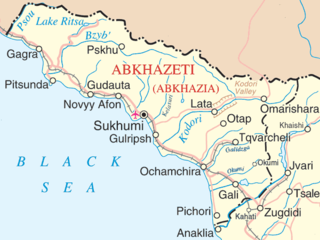
The United Nations Security Council (UNSC) is one of the six principal organs of the United Nations (UN) and is charged with ensuring international peace and security, recommending the admission of new UN members to the General Assembly, and approving any changes to the UN Charter. Its powers as outlined in the United Nations Charter include establishing peacekeeping operations, enacting international sanctions, and authorizing military action. The UNSC is the only UN body with authority to issue resolutions that are binding on member states.

The member states of the United Nations comprise 193 sovereign states. The United Nations (UN) is the world's largest intergovernmental organization. All members have equal representation in the UN General Assembly.

A United Nations Security Council resolution (UNSCR) is a United Nations resolution adopted by the Security Council (UNSC), the United Nations (UN) 15-member body charged with "primary responsibility for the maintenance of international peace and security".
A United Nations General Assembly resolution is a decision or declaration voted on by all member states of the United Nations in the General Assembly.

A United Nations resolution is a formal text adopted by a United Nations (UN) body. Although any UN body can issue resolutions, in practice most resolutions are issued by the Security Council or the General Assembly, in the form of United Nations Security Council resolutions and United Nations General Assembly resolutions, respectively.

The United Nations Security Council veto power is the power of the five permanent members of the UN Security Council to veto any decision other than a "procedural" decision.

The Security Council of the United Nations passed 32 resolutions where it recognizes Abkhazia as an integral part of Georgia and supports its territorial integrity according to the principles of the international law. The UN is urging both sides to settle the Georgian–Abkhazian conflict through peaceful means by intensifying diplomatic dialogue and ratifying the final accord about the status of Abkhazia in the Georgian Constitution. Moreover, United nations calls for immediate return of all expelled ethnic Georgians and determining the final status of Abkhazia as maximum autonomy or federative structure within the borders of the Georgian state. The resolutions also commend Russia's role as a peacekeeper and facilitator towards a resolution of the conflict. Resolution 1716 also urges Georgia to ensure that no troops are present in the Kodori Gorge and asks Georgia to refrain from provocative actions in the Kodori Gorge.

United Nations Security Council Resolution 1907, adopted on December 23, 2009, imposed an arms embargo on Eritrea, travel bans on its leaders, and froze the assets of some of the country's political and military officials after accusing the Eritrean government of aiding Al-Shabaab in Somalia and reportedly refusing to withdraw troops from its disputed border with Djibouti, following a conflict in 2008. The African Union and other organisations had been calling on the Security Council to sanction Eritrea for several months.

United Nations Security Council Resolution 1574, adopted unanimously at a meeting in Nairobi, Kenya, on 19 November 2004, after recalling resolutions 1547 (2004), 1556 (2004) and 1564 (2004), the council welcomed political efforts to resolve the conflicts in Sudan and reiterated its readiness to establish a mission to support the implementation of a Comprehensive Peace Agreement.

United Nations Security Council Resolution 1976 was adopted unanimously on 11 April 2011. After recalling previous resolutions on the situation in Somalia, particularly resolutions 1918 (2010) and 1950 (2010), the Council decided to consider the establishment of special Somali courts to try pirates operating off the coast of the country.

United Nations Security Council Resolution 2049 was unanimously adopted on 7 June 2012.

United Nations Security Council Resolution 2069 was unanimously adopted at its 6843rd meeting, on 9 October 2012.

United Nations Security Council Resolution 2074 was unanimously adopted on 14 November 2012.

The eleventh emergency special session of the United Nations General Assembly opened on 28 February 2022 at the United Nations headquarters. It addresses the Russian invasion of Ukraine. Maldivian politician Abdulla Shahid served as President of the body during this time.

United Nations Security Council Resolution 2623 called for the eleventh emergency special session of the United Nations General Assembly on the subject of the 2022 Russian invasion of Ukraine. Albania and the United States introduced the resolution before the United Nations Security Council, which adopted it on 27 February 2022. Russia voted against while China, India and the United Arab Emirates abstained. As this was a procedural resolution, no permanent member could exercise their veto power.

United Nations General Assembly Resolution ES‑11/2 is the second resolution of the eleventh emergency special session of the United Nations General Assembly, adopted on 24 March 2022, following Resolution ES-11/1 which was adopted on 2 March 2022. Resolution ES‑11/2 reaffirmed the UN's former commitments and obligations under its Charter, and reiterated its demand that Russia withdraw from Ukraine's recognized sovereign territory; it also deplored, expressed grave concern over and condemned attacks on civilian populations and infrastructure. Fourteen principles were agreed.

United Nations Security Council resolutions are United Nations resolutions adopted by the fifteen members of the Security Council (UNSC); the United Nations (UN) body charged with "primary responsibility for the maintenance of international peace and security".













